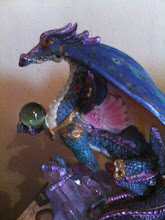Mabey quotes the manager of the shoe shop Office, in West London's fashionable Portobello Road, who describes what happened when a red fox wandered into the store in January: "We had lots of people in the middle of trying on shoes who started shrieking and ran out into the street in their socks. We shut the shop because we couldn't tell if the fox would make our customers sick." Mabey himself writes:
This is a less offensive example of a worrying new development: the New Vermin Panic. With a sense of outrage that seems borrowed from the Dark Ages, wildlife is being increasingly demonised for the slightest intrusions into human affairs.
Yeah, bloody animals. What right do they think they have to share this planet with us? It's an outrage! Canada is trying to wipe out the seal population on their Atlantic seaboard not because they overfished their waters (and are seeking fur-trade profits), but because the seals are threatening the fish stocks that their human population has every right to! Floridians aren't to blame for expanding their communities into land where alligators are plentiful, it's the alligators that are encroaching on them!
Mabey provides more examples. House martins, disliked and persecuted "because they spoil the look of pebbledash." Cormorants: "legally killed to keep coarse fishermen happy." Yew trees: Bristol City Council ripped up 100 of the trees surrounding a playground because they supposedly constituted a threat to children, even though any child would have to have no taste at all to be willing to consume enough yew foliage to constitue a poisoning threat; children would stop eating yew leaves due to their nauseating taste long before they poisoned themselves. Mabey states with flair, "[I] have been unable to trace a single case of human poisoning from yew leaves in the past 100 years."
Grey squirrels are disliked in some quarters because they dared to be successful over here. Let's just forget that some madcap Victorian brought some greys, who never asked to be taken away from their native North America, over with him in the mid-19th century. It's just too convenient to make the greys out to be the bad guys simply because they are seen as aggressive (as opposed to simply being assertive) and are "killing off" the reds, even though that is a wildly inaccurate exaggeration.
Red foxes in the UK and raccoons in the US are seen as pests because they take opportunities from the food that we waste on a daily basis. Let's villify them simply for being clever and adaptable! Mabey writes:
Roger Lovegrove's fascinating trawl through the parish records of routine wildlife slaughter, Silent Fields, shows just how deep-rooted the vermin reflex is in our culture. But I was disappointed by his sitting-on-the-fence conclusions. He abhors what he calls 'sentiment' over these issues, and says that conservationists must be prepared to make compromises with 'legitimate human interests.' I disagree. The evidence of history is all too clear about what happens when compromises are made: humans don't make the sacrifices, nature does—or rather, it becomes the sacrifice, a scapegoat."
Mabey is correct to point out, during the last paragraph of his column, that "nuisance, mess, missed targets and minor loss of income [are] not legitimate excuses for wildlife purges," although Mabey does acknowledge that real threats to life and health may sometimes merit it. It's a valid position to take.
It's time people grew out of this fear of "vermin" and accepted nature. It does the human condition no favors to foolishly, routinely and so often wrongly blame nature for our own problems.





5 comments:
The red squirrel's habitat is being destroyed little by little by new developments.
It's not so much to do with the Grey ones.
Spot on, Tusk, point well made. It seems to me that if we wish to preserve the red, we should provide more conifer forests. Yet, when it comes to preserving land, we seem to concentrate on decidious forests instead, in which the greys thrive. Greys are also very adept at living in the suburbs while reds are not. By solely villifying the grey, we are not exactly helping the red. But, alas, ignorance knows no bounds, so they say ...
You live in Bridgend? I was there myself a few years ago and saw a lot of south Wales. Lovely place.
I assume you're referring to Wales as a lovely place, rather than Bridgend! :)
I'm surprised you even remember the place!
Yeah, actually, Bridgend was where our friend lived. But he met us in Cardiff, showed us the city and drove us all over most of south-central Wales. It is gorgeous there, the countryside. I do like Wales a lot. After all, how could I, a dragon, not like the land of y ddraig goch?
on grey v red squirrels - someone mentioned on another forum, that greys can carry a disease, which is fatal to reds..
I just can't understand some peoples attitude towards animals though!
Post a Comment